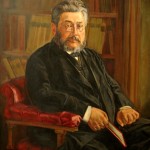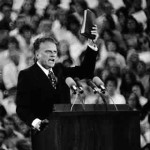 Excitement will accompany every great movement. We might justly question whether the movement was earnest and powerful if it was quite as serene as a drawing-room Bible-reading. You cannot very well blast great rocks without the sound of explosions, nor fight a battle and keep everybody as quiet as a mouse. On a dry day a carriage is not moving much along the road unless there is some noise and dust; friction and stir are the natural result of force in motion. So when the Spirit of God is abroad, and men’s minds are stirred, there must and will be certain visible signs of the movement, although these must never be confounded with the movement itself. If people imagined that to make a dust is the object aimed at by the rolling of a carriage, they can take a broom and very soon raise as much dust as fifty coaches, but they will be committing a nuisance rather than conferring a benefit. Excitement is as incidental as the dust, but it is not for one moment to be aimed at. When the woman swept her house she did it to find her money and not for the sake of raising a cloud.
Excitement will accompany every great movement. We might justly question whether the movement was earnest and powerful if it was quite as serene as a drawing-room Bible-reading. You cannot very well blast great rocks without the sound of explosions, nor fight a battle and keep everybody as quiet as a mouse. On a dry day a carriage is not moving much along the road unless there is some noise and dust; friction and stir are the natural result of force in motion. So when the Spirit of God is abroad, and men’s minds are stirred, there must and will be certain visible signs of the movement, although these must never be confounded with the movement itself. If people imagined that to make a dust is the object aimed at by the rolling of a carriage, they can take a broom and very soon raise as much dust as fifty coaches, but they will be committing a nuisance rather than conferring a benefit. Excitement is as incidental as the dust, but it is not for one moment to be aimed at. When the woman swept her house she did it to find her money and not for the sake of raising a cloud.
Do not aim at sensation and “effect.” Flowing tears and streaming eyes, sobs and outcries, and crowded after-meetings and all kinds of confusions may occur, and may be borne with as concomitants of genuine feeling, but pray do not plan their production.
It very often happens that the converts that are born in excitement die when the excitement is over. They are like certain insects which are the product of an exceedingly warm day, and die when the sun goes down…
To win a soul it is necessary, not only to instruct our hearer and make him know the truth, but to impress him so that he may feel it. A purely didactic ministry, which should always appeal to the understanding and should leave the emotions untouched, would certainly be a limping ministry. “The legs of the lame are not equal,” says Solomon, and the unequal legs of some ministries cripple them. We have seen such an one limping about with a long doctrinal leg, but a very short emotional leg. It is a horrible thing for a man to be so doctrinal that he can speak coolly of the doom of the wicked, so that if he does not actually praise God for it, it costs him no anguish of heart to think of the ruin of millions of our race. This is horrible! I hate to hear the terrors of the Lord proclaimed by men whose hard visages, harsh tones, and unfeeling spirit betray a sort of doctrinal desiccation: all the milk of human kindness is dried out of them. Having no feeling himself, such a preacher creates none, and the people sit and listen while he keeps to dry, lifeless statements, until they come to value him for being “sound,” and they themselves come to be sound too, and I need not add sound asleep also, or what life they have is spent in sniffing out heresy, and making earnest men offenders for a word. Into this spirit may we never be baptized. Whatever I believe, or do not believe, the command to love my neighbor as myself still retains its claim upon me, and God forbid that any views or opinions should so contract my soul and harden my heart as to make me forget this law of love…
A sinner has a heart as well as a head; a sinner has emotions as well as thoughts; and we must appeal to both. A sinner will never be converted until his emotions are stirred. Unless he feels sorrow for sin, and unless he has some measure of joy in the reception of the word, you cannot have much hope of him. The truth must soak into the soul, and dye it with its own colour. The word must be like a strong wind sweeping through the whole heart, and swaying the whole man, even as a field of ripening corn waves in the summer breeze. Religion without emotion is religion without life. But, still, we must mind how these emotions are caused. Do not play upon the mind by exciting feelings which are not spiritual…
A young preacher once remarked, “Were you not greatly struck to see so large a congregation weeping?”
“Yes,” said his judicious friend, “but I was more struck with the reflection that they would probably have wept more at a play.” Exactly so: and the weeping in both cases may be equally valueless. I saw a girl on board a steamboat reading a book and crying as if her heart would break, but when I glanced at the volume I saw that it was only one of those silly yellow-covered novels which load our railway bookstalls. Her tears were a sheer waste of moisture, and so are those which are produced by mere pulpit tale-telling and death-bed painting. If our hearers will weep over their sins, and after Jesus, let their sorrows flow in rivers, but if the object of their tears is merely natural and not at all spiritual, what good is done by setting them weeping? There might be some virtue in making people joyful, for there is sorrow enough in the world, and the more we can promote cheerfulness the better, but what is the use of creating needless misery? What right have you to go through the world pricking everybody with your lancet just to show your skill in surgery? A true physician only makes incisions in order to effect cures, and a wise minister only excites painful emotions in men’s minds with the distinct object of blessing their souls. You and I must continue to drive at men’s hearts till they are broken; and then we must keep on preaching Christ crucified till their hearts are bound up, and when this is accomplished we must continue to proclaim the gospel till their whole nature is brought into subjection to the gospel of Christ.
– C. H. Spurgeon, The Sword and Trowel: 1879 (London: Passmore & Alabaster, 1879), 141–145.

